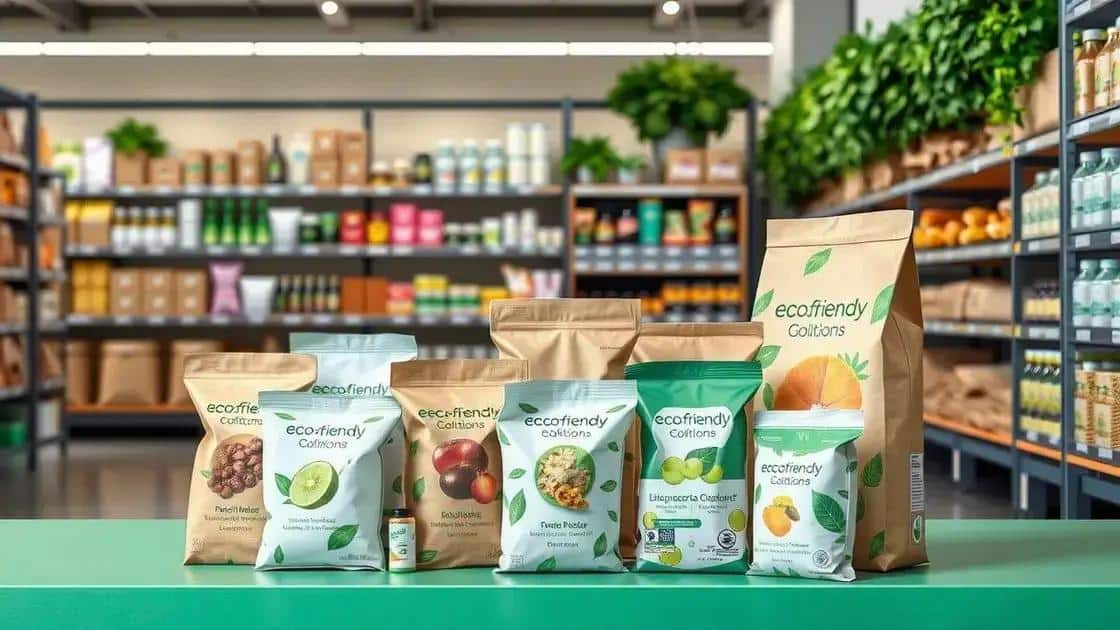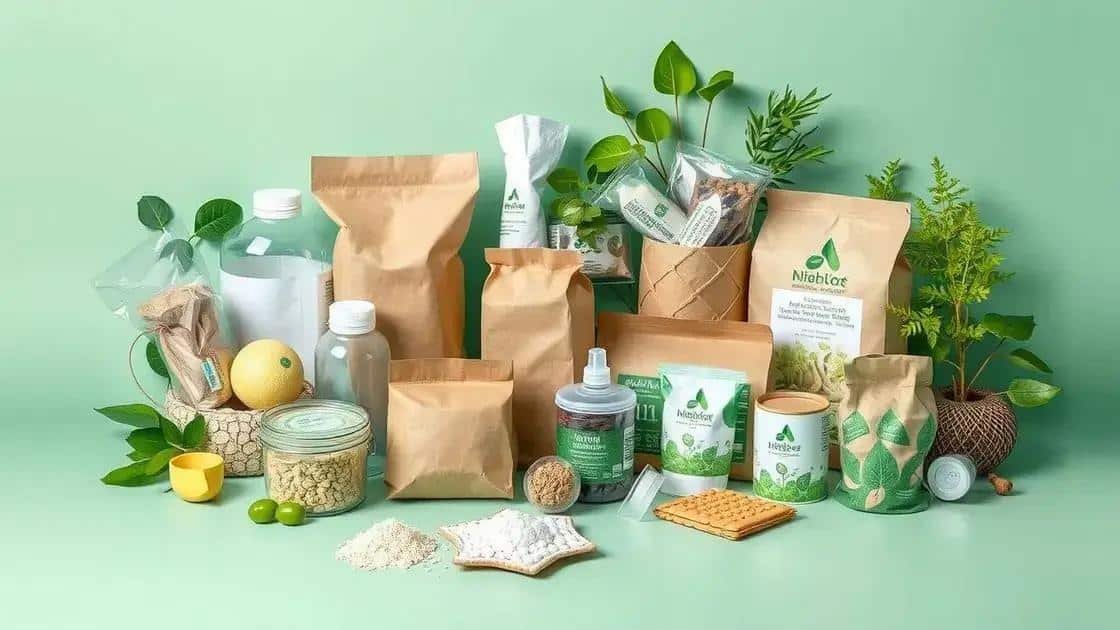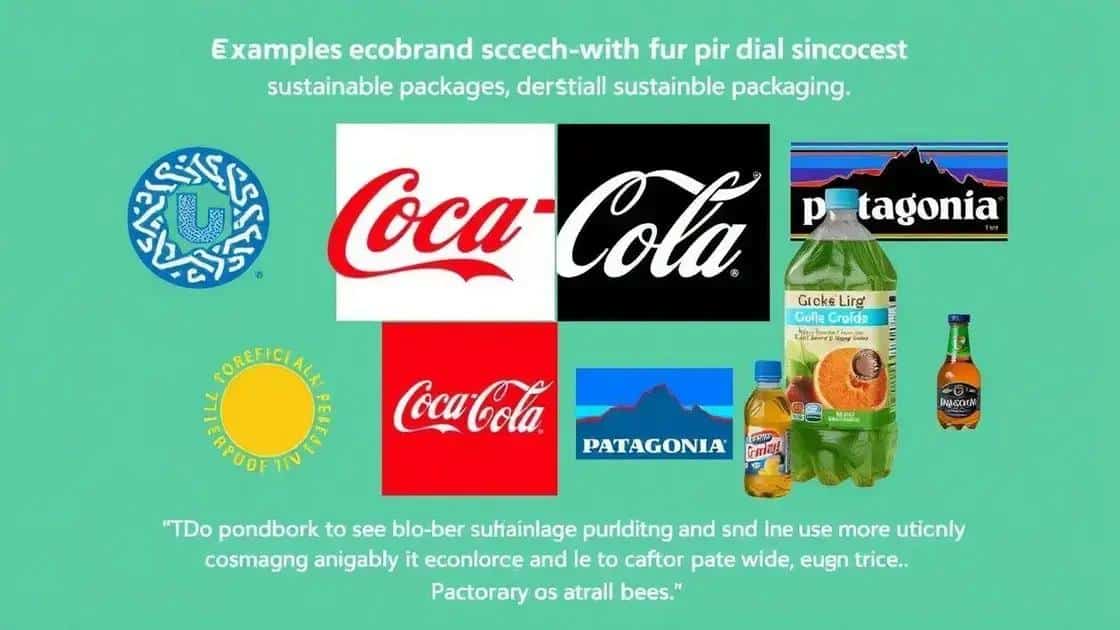Insights on sustainable packaging news: What you need to know

Insights on sustainable packaging news reveal that leading brands are adapting to consumer demand by incorporating eco-friendly materials, resulting in innovative solutions that enhance brand loyalty and support environmental goals.
Insights on sustainable packaging news reveal the evolving landscape where companies embrace eco-friendly alternatives. Curious how these changes might impact your shopping habits? Let’s dive into the latest trends!
The rise of sustainable packaging
The rise of sustainable packaging has transformed how companies think about their products and the environment. As consumers become more aware of their impact on the earth, businesses are starting to adapt. This shift isn’t just a trend; it’s a necessary step toward a more sustainable future.
Understanding Sustainable Packaging
Sustainable packaging refers to packaging solutions that are environmentally friendly. This can mean the use of materials that are recycled, biodegradable, or made from renewable resources. With a growing concern about plastic waste, many brands are taking this issue seriously.
Key Benefits of Sustainable Packaging
Transitioning to sustainable packaging offers numerous advantages:
- Reduces environmental footprint
- Enhances brand image with eco-conscious consumers
- Meet regulatory demands and avoid penalties
Moreover, sustainable packaging can be an innovative way to showcase product features while contributing positively to the planet. Brands that invest in these materials often find that their customers are more loyal and willing to promote their product.
As businesses explore their options, they are discovering exciting materials like mushroom packaging and seaweed-based options. These novel solutions not only work well but also tell a story. Consumers appreciate products that prioritize the planet, and this connection can lead to increased sales.
Real-World Examples
Numerous companies have already made significant strides in this arena:
- Unilever has committed to making all its plastic packaging recyclable or reusable by 2025.
- Coca-Cola is experimenting with plant-based bottles to replace traditional plastics.
- Amazon has started using less plastic in its packaging by opting for paper-based solutions.
These examples highlight that the transition to sustainable packaging is not just feasible; it is already happening. As the movement grows, so too will the innovations that drive it forward.
With the public increasingly demanding changes, brands that do not adapt risk falling behind. Exploring sustainable packaging solutions now will not only benefit the environment but also resonate with consumers long-term.
Key innovations in eco-friendly materials

Recent advancements in eco-friendly materials are reshaping the packaging industry. As awareness about environmental issues grows, companies are investing in innovations that not only meet consumer demands but also reduce their ecological footprint. From biodegradable plastics to innovative paper products, the solutions being developed are impressive.
Biodegradable Plastics
One of the most exciting developments is in the realm of biodegradable plastics. These materials are designed to break down more quickly than traditional plastics, reducing their impact on landfills and oceans. Some biodegradable plastics are made from natural sources, such as cornstarch, which makes them a great option for sustainable packaging.
Recycled Paper Products
Moreover, recycled paper used in packaging offers a versatile and sustainable option. Brands are utilizing post-consumer waste to create durable packaging solutions. This not only saves trees but also helps reduce waste. Consumers are increasingly drawn to products packaged in materials like this, as they feel a connection to sustainability.
- Recyclability helps reduce production waste.
- Reduced carbon emissions in the creation process.
- Enhanced consumer perception of brand responsibility.
Another innovative approach is using materials derived from plants. For instance, seaweed and mushroom-based packaging are gaining popularity. These natural materials are not only compostable but also contribute to a circular economy where waste is minimized.
Plant-Based Packaging
Plant-based packaging is setting new standards in sustainability. It often comes from renewable resources and can provide the same level of protection as conventional materials. As more brands commit to using these alternatives, we see a shift toward a more sustainable future.
Engaging with these innovations in eco-friendly materials allows companies to appeal to a growing market of environmentally conscious consumers. As they choose sustainable alternatives, brands not only contribute to a better planet but also enhance their reputation in a competitive market.
Consumer demand for sustainable practices
The growing consumer demand for sustainable practices is a powerful force in today’s market. Shoppers are becoming more conscious of their purchasing choices and are increasingly favoring brands that prioritize environmental responsibility. This trend is reshaping industries, particularly in packaging.
Shifting Consumer Values
Modern consumers are not just looking for quality products; they want items that align with their values. Many are willing to pay more for products packaged sustainably. This commitment is evident across all age groups, but especially among younger generations who prioritize sustainability.
Survey Insights
Recent surveys reveal some compelling statistics:
- Approximately 75% of consumers indicate they would switch to brands that are more environmentally friendly.
- Over 50% of shoppers are actively seeking out products with sustainable packaging.
- A significant number of consumers are influenced by brands’ sustainability commitments when making purchases.
As these values become mainstream, businesses must adapt to stay relevant. Many brands are responding by overhauling their packaging and supply chains, focusing on materials that reduce waste and environmental impact.
Moreover, social media plays a crucial role in amplifying consumer voices. Customers are sharing their thoughts and experiences online, which influences others. Brands that communicate their environmental efforts effectively tend to perform better and garner loyalty.
Impact on Brand Loyalty
Companies prioritizing sustainable practices often experience enhanced brand loyalty. Customers appreciate transparency and dedication to sustainability, which can lead to repeat purchases and positive word-of-mouth. This creates a cycle where sustainability not only attracts customers but also retains them.
Ultimately, the consumer demand for sustainable practices continues to shape the market. Brands that invest in sustainability not only contribute to environmental health but also position themselves favorably among consumers who increasingly prioritize eco-friendly choices.
Case studies of successful brands

Examining case studies of successful brands provides valuable insights into how businesses can thrive in the evolving landscape of sustainable packaging. These brands demonstrate the impact of commitment to sustainability and how it can redefine market presence.
Brand Examples Leading the Way
Many companies are setting the standard for sustainability in packaging. For instance, Unilever has committed to making all of its plastic packaging recyclable or reusable by 2025. This pledge not only enhances its reputation but also sets an industry benchmark.
Beverage Industry Innovations
The beverage giant Coca-Cola is another brand making significant strides. They are focusing on creating bottles made from plant-based materials. This innovation allows them to reduce their reliance on fossil fuels and decrease their overall carbon footprint.
- Utilizing renewable resources in packaging.
- Targeting a 50% reduction in plastic usage.
- Investing in recycling programs globally.
Additionally, brands like Patagonia have incorporated sustainable practices throughout their supply chain. From the materials used in their products to the packaging, Patagonia showcases how sustainable values can resonate with consumers. Their commitment to reducing environmental impact has earned them a loyal customer base that actively supports their initiatives.
Startups Making an Impact
Even startups are embracing this movement. For instance, BioPak focuses on eco-friendly disposable packaging. Their products are compostable and made from renewable resources. Such innovations are appealing to consumers who want to make environmentally conscious choices.
As these case studies of successful brands illustrate, integrating sustainability into business models is not just beneficial for the planet; it can also drive profitability and customer loyalty. Brands that prioritize innovation in sustainable packaging are leading the way into a greener future.
FAQ – Frequently Asked Questions about Sustainable Packaging
What is sustainable packaging?
Sustainable packaging refers to packaging solutions that are designed to have a minimal environmental impact. This includes using materials that are recyclable, biodegradable, or made from renewable resources.
Why is consumer demand for sustainable practices increasing?
Consumers are becoming more aware of environmental issues and prefer brands that demonstrate responsibility through sustainable practices, leading to a significant shift in purchasing behavior.
Can sustainable packaging be cost-effective for businesses?
Yes, while there may be initial costs associated with switching to sustainable materials, many businesses find that it can lead to long-term savings and increased customer loyalty.
Which brands are recognized for their sustainable packaging efforts?
Brands like Unilever, Coca-Cola, and Patagonia are well-known for their commitment to sustainable packaging and have implemented innovative solutions that reduce their environmental footprint.






